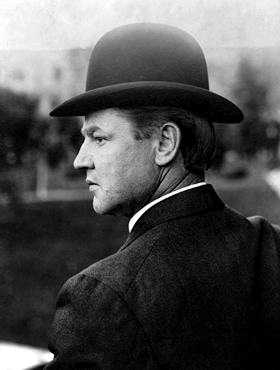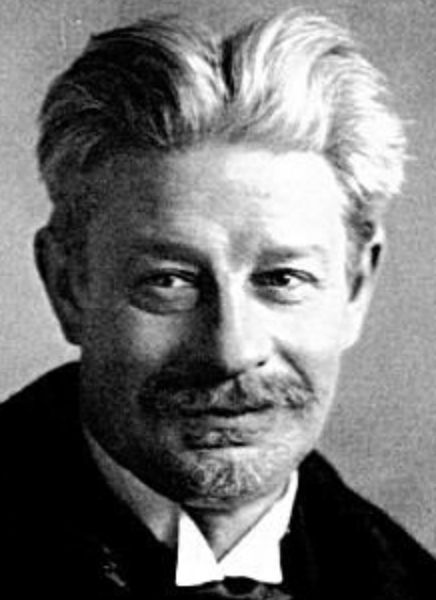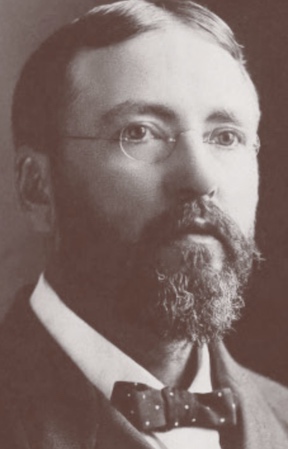February 4
Bill Haywood

On this date in 1869, William Dudley “Big Bill” Haywood was born in Salt Lake City, Utah Territory. In 1896, when working in an Idaho silver mine, Haywood joined the Western Federation of Miners and became active in the union. By 1900 he was already a member of the union’s General Executive Board. Haywood was an advocate for industrial unionism, uniting all workers in “one big union,” and was a founding member of the Industrial Workers of the World (Wobblies) in 1905.
Haywood advocated direct action and strikes and was involved in many strikes, where he used innovative tactics in order to attract the attention of the press. He had been involved with the Socialist Party of America but he and many IWW members wanted to focus on direct action and radical revolution instead of electoral politics and split from the Socialists in 1913. Haywood was also an advocate for racial unity in the labor movement, bringing black and white workers in segregated states into IWW-affiliated unions.
In 1917, Haywood and 164 other IWW members were charged under the Espionage Act of 1917 for “conspiring to hinder the draft, encourage desertion, and intimidate others in connection with labor disputes.” Judge Kenesaw Mountain Landis presided over the five-month trial. Haywood was convicted and sentenced to 20 years in prison but skipped bail and fled to the newly formed Soviet Union.
Haywood served as a labor adviser to Lenin’s government until 1923, when Stalin rose to power. He did not speak Russian, and his Russian wife did not speak English. He died in 1928 from complications of alcoholism, diabetes and a stroke. After his cremation, his ashes were split between the Kremlin Wall necropolis in Moscow and Chicago, where they were buried near the Haymarket Square Martyr’s Monument.
“To me [Christianity] was all nonsense, based on that profane compilation of fables called the Bible.”
— "Bill Haywood's Book: The Autobiography of Big Bill Haywood" (1929)
Georg Brandes

On this date in 1842, Danish intellectual Georg Morris Cohen Brandes was born into a nonobservant Jewish family in Copenhagen, the elder brother of freethinkers Ernst and Carl Edvard Brandes. He studied jurisprudence at the University of Copenhagen before switching to philosophy and aesthetics.
He traveled through Europe from 1865-71 to acquaint himself with the condition of literature in academia. He published Aesthetic Studies (1868), a series of brief monographs on Danish poets, followed in 1870 by The French Aesthetics of the Present Day, dealing chiefly with Hippolyte Taine’s Criticisms and Portraits and a translation of The Subjection of Women by John Stuart Mill. His aesthetics lectures at the University of Copenhagen started attracting large audiences but he was refused a professorship due to his atheism and his “Modern Breakthrough” theory of the principles of a new realism and naturalism in literature being seen as too radical.
He published the six-volume Main Currents in Nineteenth-Century Literature starting in 1906. It was among the 100 best books for education selected in 1929 by historian Will Durant. His last years were dedicated to anti-religious polemic. He argued against the historicity of Jesus and published Sagnet om Jesus, which was translated as Jesus: A Myth in 1926. He died at age 85 in 1927.
“Brandes challenged Kierkegaard’s insistence on the centrality of religion on human life by promoting a secular interpretation of his works, stripped of their religious context.”
— "Kierkegaard's Influence on Literature, Criticism and Art: Denmark," ed. Jon Stewart (2013)
Eugene M. MacDonald

On this date in 1855, Eugene Montague MacDonald was born. The American journalist became a foreman at The Truth Seeker, a 19th-century freethought newspaper. When Truth Seeker founder D.M. Bennett died, MacDonald and two others established The Truth Seeker Company, buying the newspaper in 1883. MacDonald edited the 19th century’s leading freethought publication for 26 years. His brother George took over editorship when Eugene retired shortly before his death. Truth Seeker readers and contributors included Clarence Darrow, who wrote in 1931 that he had been connected with the publication for 50 years. (D. 1909)
PHOTO: MacDonald, c. 1883.
“The Chicago World’s Fair having been decreed, the kind of church people who adopt meddling as a means of grace saw that now was their day of salvation. Hitherto, with their fussy restrictions on Sunday work and amusements, they had been obliged to function merely as local nuisances. Now they would close the World’s Fair on Sunday and make themselves felt as pests by all nations.”
— From The Truth Seeker, 1892, cited in "Fifty Years of Freethought, Vol. II" by George MacDonald (1929)
